6CC544 Computing Technologies in Society: Privacy, Ethics & Impact
VerifiedAdded on 2023/06/15
|74
|14469
|330
Homework Assignment
AI Summary
This assignment delves into the societal implications of computing technologies, addressing key issues such as plagiarism, digital privacy erosion, and the ethical considerations surrounding emerging technologies like biometric data, driverless vehicles, and RFID. It explores how digital technologies compromise personal privacy through hacking, online tracking, and banking detail theft. The assignment further discusses the ramifications of biometric data use, the social impacts of driverless vehicles on transport, and the ethical concerns related to RFID implementation, including privacy, health risks, and government regulation. It also includes a discussion board posting, showcasing active engagement with course concepts and critical analysis of statements regarding privacy and surveillance. The project work focuses on drone technology, highlighting its potential in areas such as traffic management and surveillance. The student reflects on the decision to work independently, emphasizing control over the assignment and personal interest in the topic.
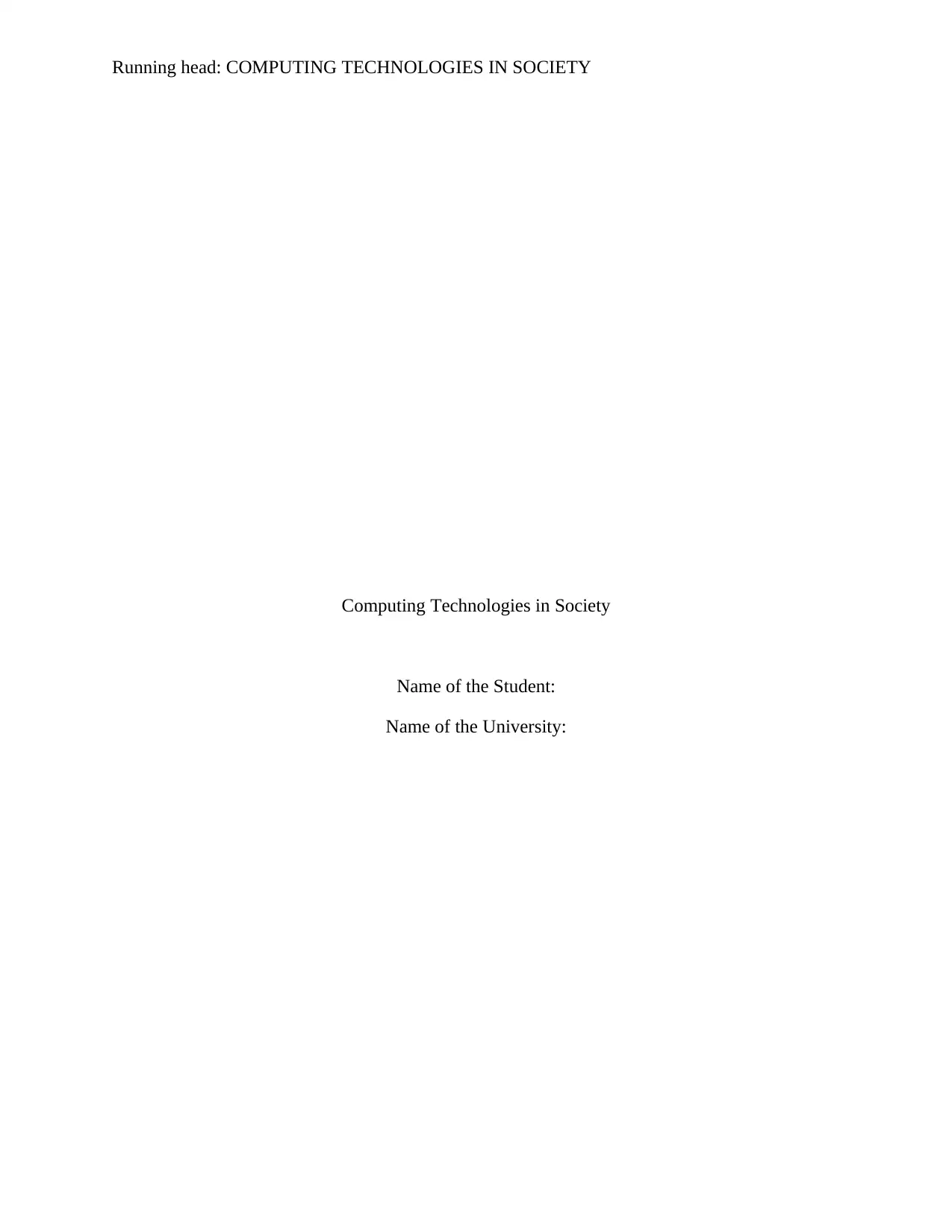
Running head: COMPUTING TECHNOLOGIES IN SOCIETY
Computing Technologies in Society
Name of the Student:
Name of the University:
Computing Technologies in Society
Name of the Student:
Name of the University:
Paraphrase This Document
Need a fresh take? Get an instant paraphrase of this document with our AI Paraphraser
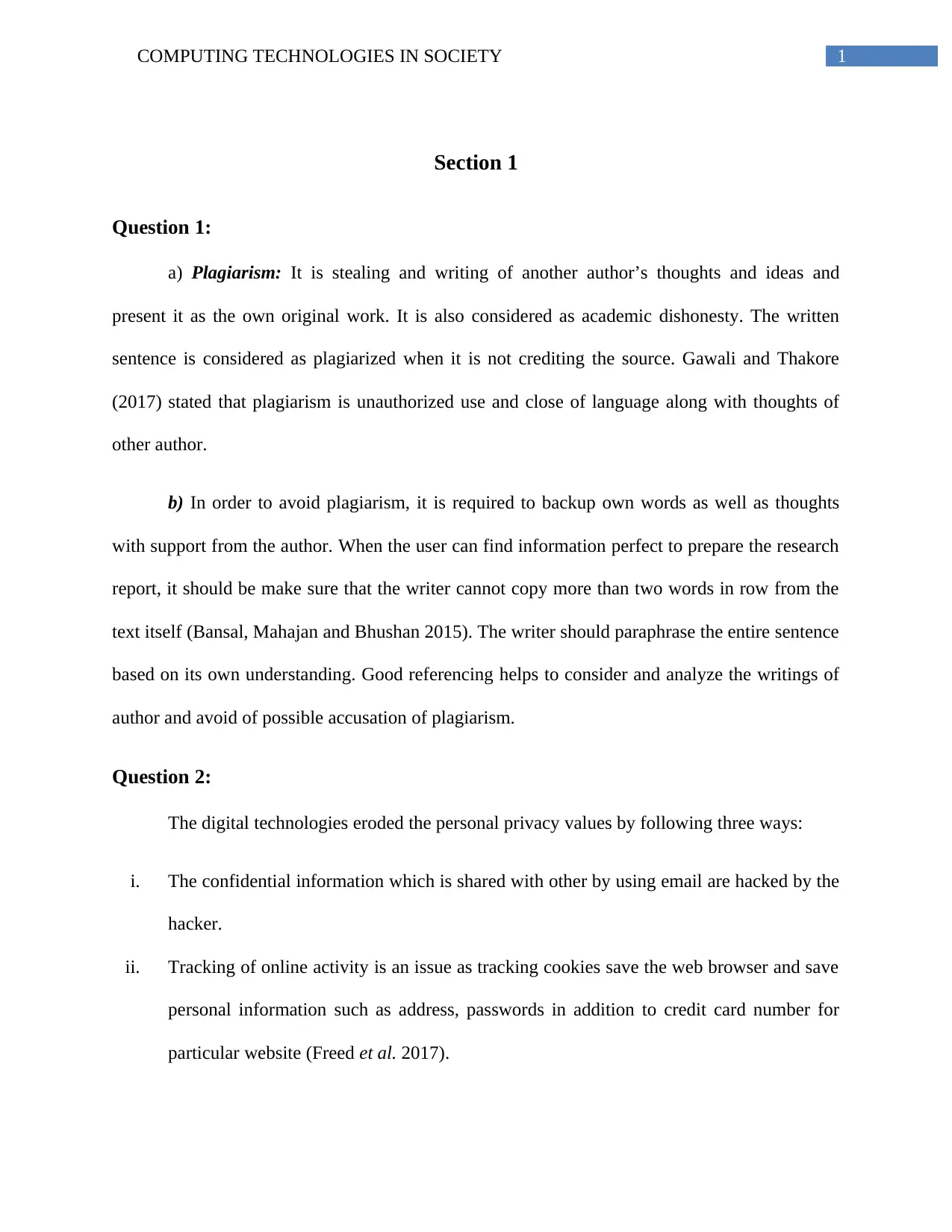
1COMPUTING TECHNOLOGIES IN SOCIETY
Section 1
Question 1:
a) Plagiarism: It is stealing and writing of another author’s thoughts and ideas and
present it as the own original work. It is also considered as academic dishonesty. The written
sentence is considered as plagiarized when it is not crediting the source. Gawali and Thakore
(2017) stated that plagiarism is unauthorized use and close of language along with thoughts of
other author.
b) In order to avoid plagiarism, it is required to backup own words as well as thoughts
with support from the author. When the user can find information perfect to prepare the research
report, it should be make sure that the writer cannot copy more than two words in row from the
text itself (Bansal, Mahajan and Bhushan 2015). The writer should paraphrase the entire sentence
based on its own understanding. Good referencing helps to consider and analyze the writings of
author and avoid of possible accusation of plagiarism.
Question 2:
The digital technologies eroded the personal privacy values by following three ways:
i. The confidential information which is shared with other by using email are hacked by the
hacker.
ii. Tracking of online activity is an issue as tracking cookies save the web browser and save
personal information such as address, passwords in addition to credit card number for
particular website (Freed et al. 2017).
Section 1
Question 1:
a) Plagiarism: It is stealing and writing of another author’s thoughts and ideas and
present it as the own original work. It is also considered as academic dishonesty. The written
sentence is considered as plagiarized when it is not crediting the source. Gawali and Thakore
(2017) stated that plagiarism is unauthorized use and close of language along with thoughts of
other author.
b) In order to avoid plagiarism, it is required to backup own words as well as thoughts
with support from the author. When the user can find information perfect to prepare the research
report, it should be make sure that the writer cannot copy more than two words in row from the
text itself (Bansal, Mahajan and Bhushan 2015). The writer should paraphrase the entire sentence
based on its own understanding. Good referencing helps to consider and analyze the writings of
author and avoid of possible accusation of plagiarism.
Question 2:
The digital technologies eroded the personal privacy values by following three ways:
i. The confidential information which is shared with other by using email are hacked by the
hacker.
ii. Tracking of online activity is an issue as tracking cookies save the web browser and save
personal information such as address, passwords in addition to credit card number for
particular website (Freed et al. 2017).
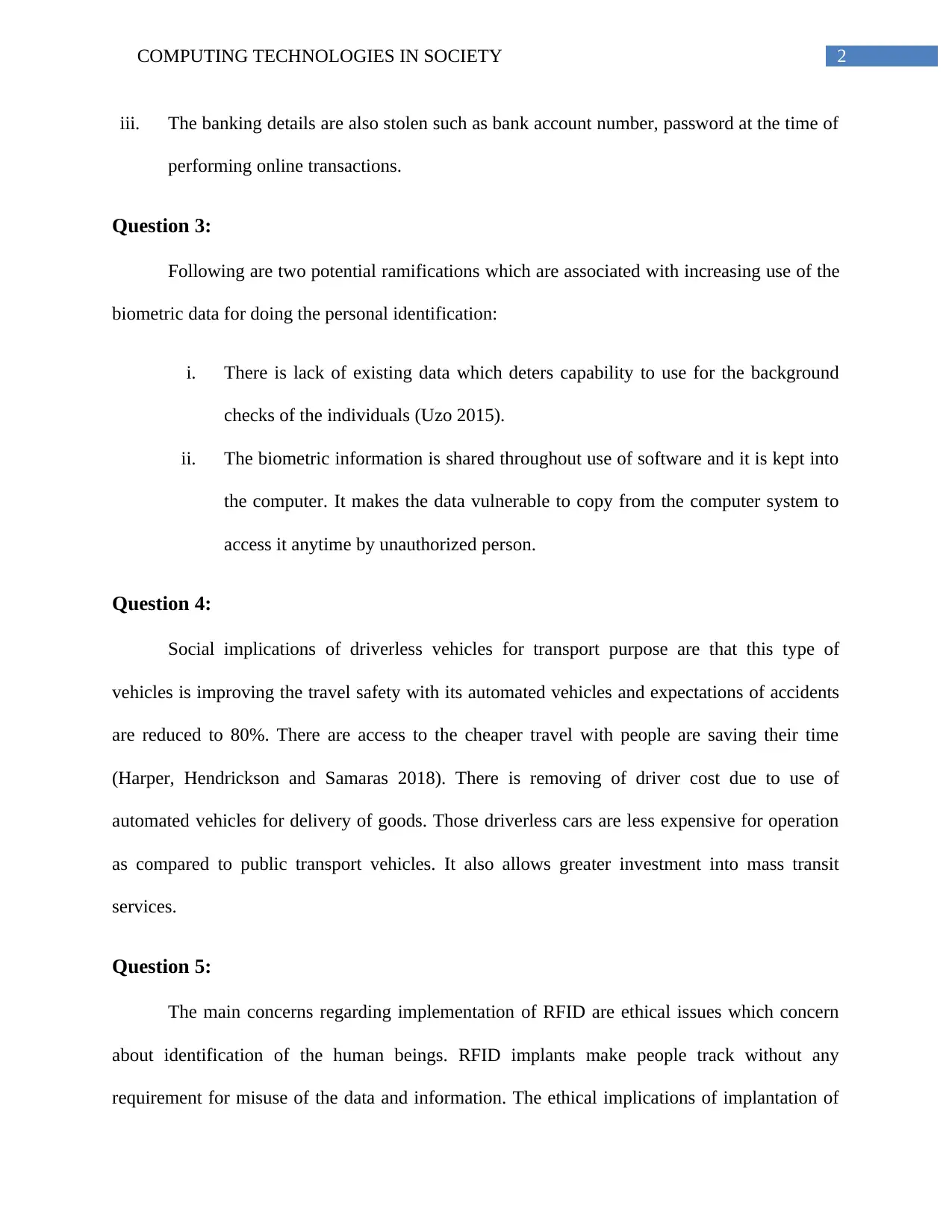
2COMPUTING TECHNOLOGIES IN SOCIETY
iii. The banking details are also stolen such as bank account number, password at the time of
performing online transactions.
Question 3:
Following are two potential ramifications which are associated with increasing use of the
biometric data for doing the personal identification:
i. There is lack of existing data which deters capability to use for the background
checks of the individuals (Uzo 2015).
ii. The biometric information is shared throughout use of software and it is kept into
the computer. It makes the data vulnerable to copy from the computer system to
access it anytime by unauthorized person.
Question 4:
Social implications of driverless vehicles for transport purpose are that this type of
vehicles is improving the travel safety with its automated vehicles and expectations of accidents
are reduced to 80%. There are access to the cheaper travel with people are saving their time
(Harper, Hendrickson and Samaras 2018). There is removing of driver cost due to use of
automated vehicles for delivery of goods. Those driverless cars are less expensive for operation
as compared to public transport vehicles. It also allows greater investment into mass transit
services.
Question 5:
The main concerns regarding implementation of RFID are ethical issues which concern
about identification of the human beings. RFID implants make people track without any
requirement for misuse of the data and information. The ethical implications of implantation of
iii. The banking details are also stolen such as bank account number, password at the time of
performing online transactions.
Question 3:
Following are two potential ramifications which are associated with increasing use of the
biometric data for doing the personal identification:
i. There is lack of existing data which deters capability to use for the background
checks of the individuals (Uzo 2015).
ii. The biometric information is shared throughout use of software and it is kept into
the computer. It makes the data vulnerable to copy from the computer system to
access it anytime by unauthorized person.
Question 4:
Social implications of driverless vehicles for transport purpose are that this type of
vehicles is improving the travel safety with its automated vehicles and expectations of accidents
are reduced to 80%. There are access to the cheaper travel with people are saving their time
(Harper, Hendrickson and Samaras 2018). There is removing of driver cost due to use of
automated vehicles for delivery of goods. Those driverless cars are less expensive for operation
as compared to public transport vehicles. It also allows greater investment into mass transit
services.
Question 5:
The main concerns regarding implementation of RFID are ethical issues which concern
about identification of the human beings. RFID implants make people track without any
requirement for misuse of the data and information. The ethical implications of implantation of
⊘ This is a preview!⊘
Do you want full access?
Subscribe today to unlock all pages.

Trusted by 1+ million students worldwide
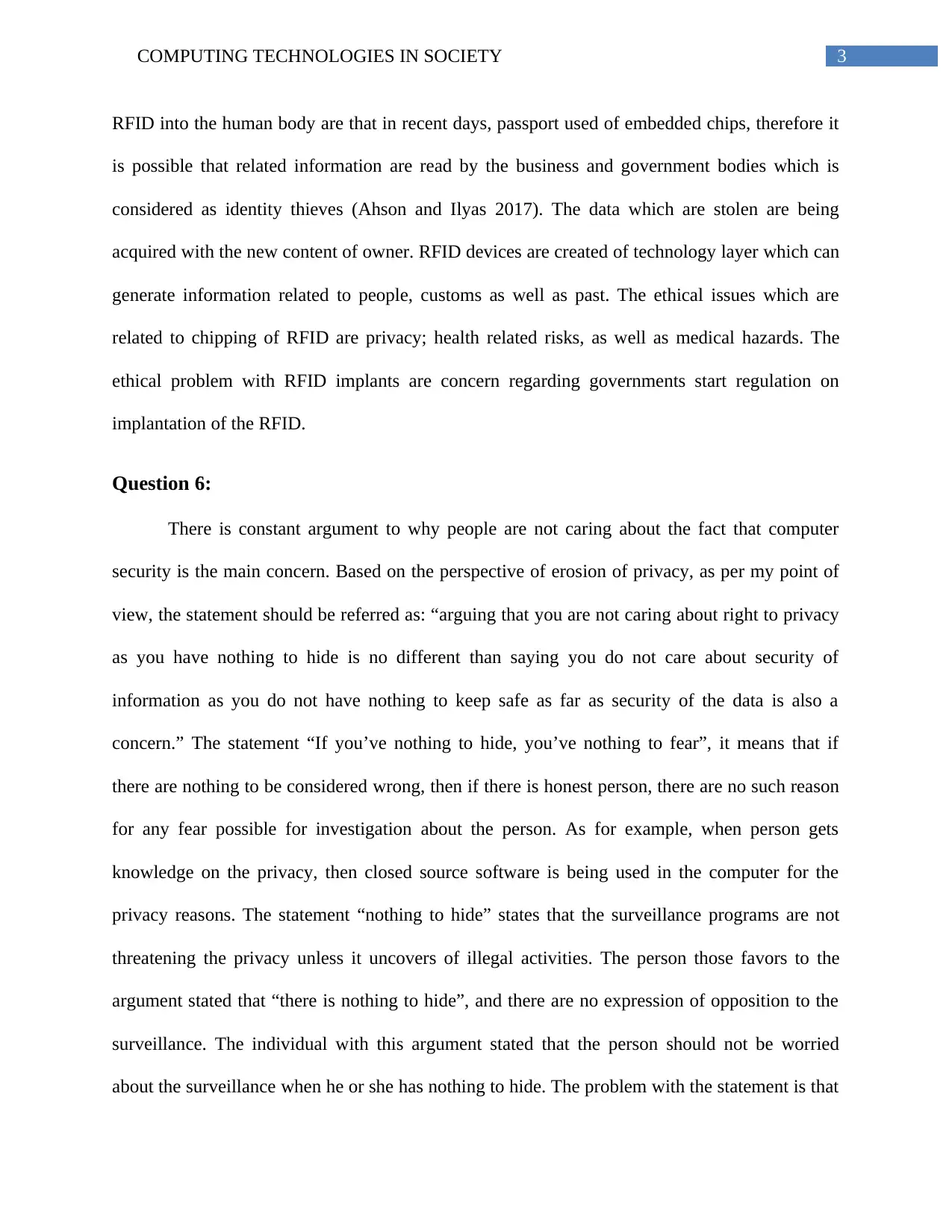
3COMPUTING TECHNOLOGIES IN SOCIETY
RFID into the human body are that in recent days, passport used of embedded chips, therefore it
is possible that related information are read by the business and government bodies which is
considered as identity thieves (Ahson and Ilyas 2017). The data which are stolen are being
acquired with the new content of owner. RFID devices are created of technology layer which can
generate information related to people, customs as well as past. The ethical issues which are
related to chipping of RFID are privacy; health related risks, as well as medical hazards. The
ethical problem with RFID implants are concern regarding governments start regulation on
implantation of the RFID.
Question 6:
There is constant argument to why people are not caring about the fact that computer
security is the main concern. Based on the perspective of erosion of privacy, as per my point of
view, the statement should be referred as: “arguing that you are not caring about right to privacy
as you have nothing to hide is no different than saying you do not care about security of
information as you do not have nothing to keep safe as far as security of the data is also a
concern.” The statement “If you’ve nothing to hide, you’ve nothing to fear”, it means that if
there are nothing to be considered wrong, then if there is honest person, there are no such reason
for any fear possible for investigation about the person. As for example, when person gets
knowledge on the privacy, then closed source software is being used in the computer for the
privacy reasons. The statement “nothing to hide” states that the surveillance programs are not
threatening the privacy unless it uncovers of illegal activities. The person those favors to the
argument stated that “there is nothing to hide”, and there are no expression of opposition to the
surveillance. The individual with this argument stated that the person should not be worried
about the surveillance when he or she has nothing to hide. The problem with the statement is that
RFID into the human body are that in recent days, passport used of embedded chips, therefore it
is possible that related information are read by the business and government bodies which is
considered as identity thieves (Ahson and Ilyas 2017). The data which are stolen are being
acquired with the new content of owner. RFID devices are created of technology layer which can
generate information related to people, customs as well as past. The ethical issues which are
related to chipping of RFID are privacy; health related risks, as well as medical hazards. The
ethical problem with RFID implants are concern regarding governments start regulation on
implantation of the RFID.
Question 6:
There is constant argument to why people are not caring about the fact that computer
security is the main concern. Based on the perspective of erosion of privacy, as per my point of
view, the statement should be referred as: “arguing that you are not caring about right to privacy
as you have nothing to hide is no different than saying you do not care about security of
information as you do not have nothing to keep safe as far as security of the data is also a
concern.” The statement “If you’ve nothing to hide, you’ve nothing to fear”, it means that if
there are nothing to be considered wrong, then if there is honest person, there are no such reason
for any fear possible for investigation about the person. As for example, when person gets
knowledge on the privacy, then closed source software is being used in the computer for the
privacy reasons. The statement “nothing to hide” states that the surveillance programs are not
threatening the privacy unless it uncovers of illegal activities. The person those favors to the
argument stated that “there is nothing to hide”, and there are no expression of opposition to the
surveillance. The individual with this argument stated that the person should not be worried
about the surveillance when he or she has nothing to hide. The problem with the statement is that
Paraphrase This Document
Need a fresh take? Get an instant paraphrase of this document with our AI Paraphraser
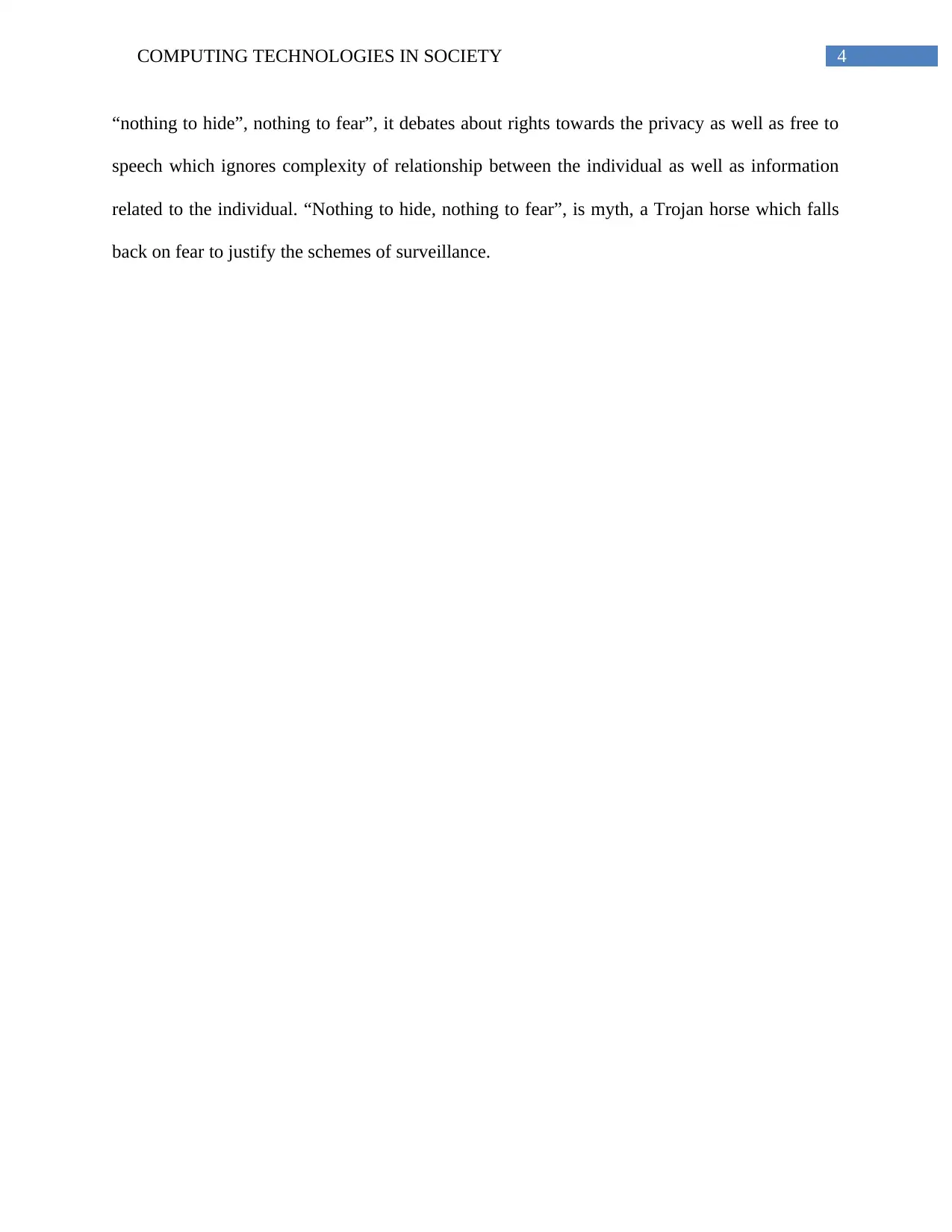
4COMPUTING TECHNOLOGIES IN SOCIETY
“nothing to hide”, nothing to fear”, it debates about rights towards the privacy as well as free to
speech which ignores complexity of relationship between the individual as well as information
related to the individual. “Nothing to hide, nothing to fear”, is myth, a Trojan horse which falls
back on fear to justify the schemes of surveillance.
“nothing to hide”, nothing to fear”, it debates about rights towards the privacy as well as free to
speech which ignores complexity of relationship between the individual as well as information
related to the individual. “Nothing to hide, nothing to fear”, is myth, a Trojan horse which falls
back on fear to justify the schemes of surveillance.
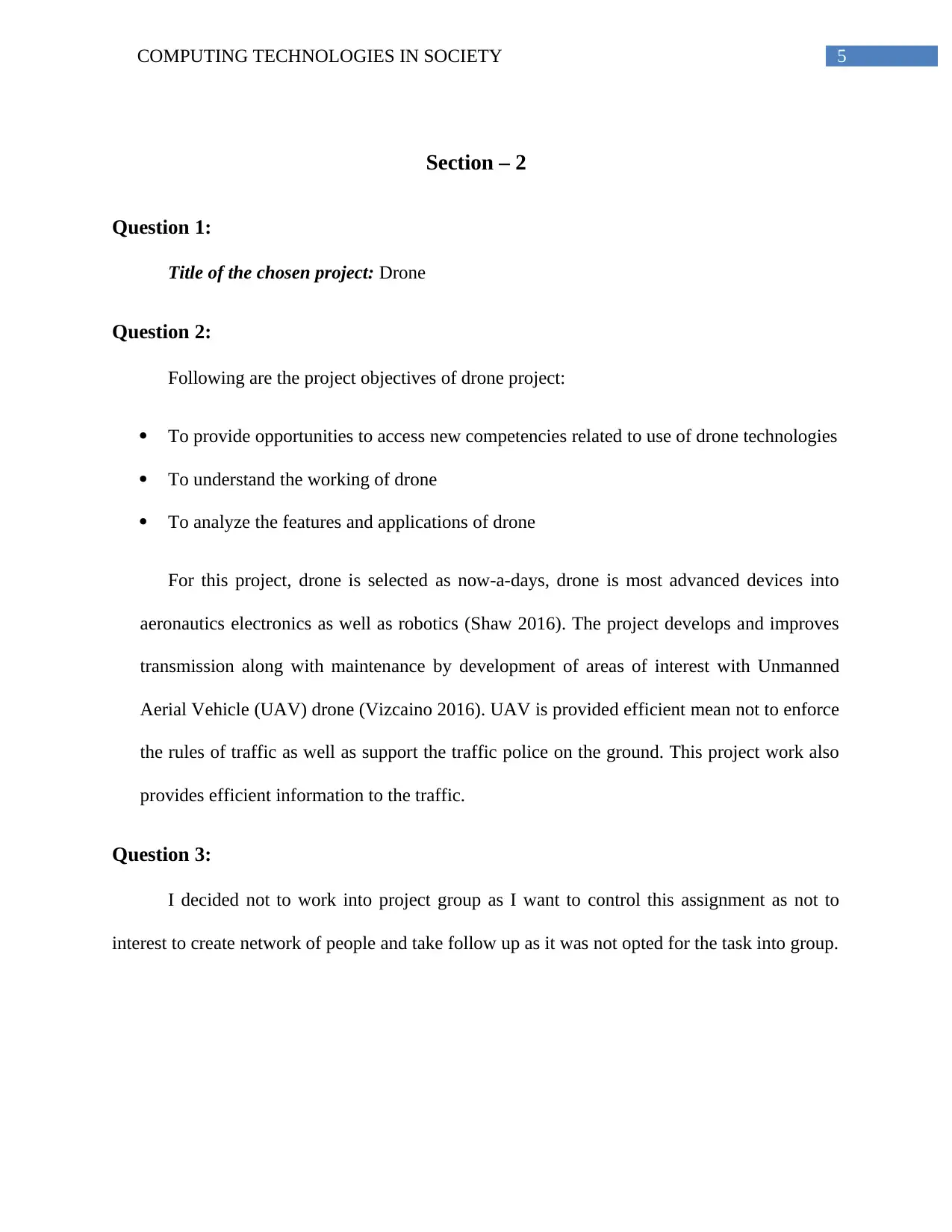
5COMPUTING TECHNOLOGIES IN SOCIETY
Section – 2
Question 1:
Title of the chosen project: Drone
Question 2:
Following are the project objectives of drone project:
To provide opportunities to access new competencies related to use of drone technologies
To understand the working of drone
To analyze the features and applications of drone
For this project, drone is selected as now-a-days, drone is most advanced devices into
aeronautics electronics as well as robotics (Shaw 2016). The project develops and improves
transmission along with maintenance by development of areas of interest with Unmanned
Aerial Vehicle (UAV) drone (Vizcaino 2016). UAV is provided efficient mean not to enforce
the rules of traffic as well as support the traffic police on the ground. This project work also
provides efficient information to the traffic.
Question 3:
I decided not to work into project group as I want to control this assignment as not to
interest to create network of people and take follow up as it was not opted for the task into group.
Section – 2
Question 1:
Title of the chosen project: Drone
Question 2:
Following are the project objectives of drone project:
To provide opportunities to access new competencies related to use of drone technologies
To understand the working of drone
To analyze the features and applications of drone
For this project, drone is selected as now-a-days, drone is most advanced devices into
aeronautics electronics as well as robotics (Shaw 2016). The project develops and improves
transmission along with maintenance by development of areas of interest with Unmanned
Aerial Vehicle (UAV) drone (Vizcaino 2016). UAV is provided efficient mean not to enforce
the rules of traffic as well as support the traffic police on the ground. This project work also
provides efficient information to the traffic.
Question 3:
I decided not to work into project group as I want to control this assignment as not to
interest to create network of people and take follow up as it was not opted for the task into group.
⊘ This is a preview!⊘
Do you want full access?
Subscribe today to unlock all pages.

Trusted by 1+ million students worldwide
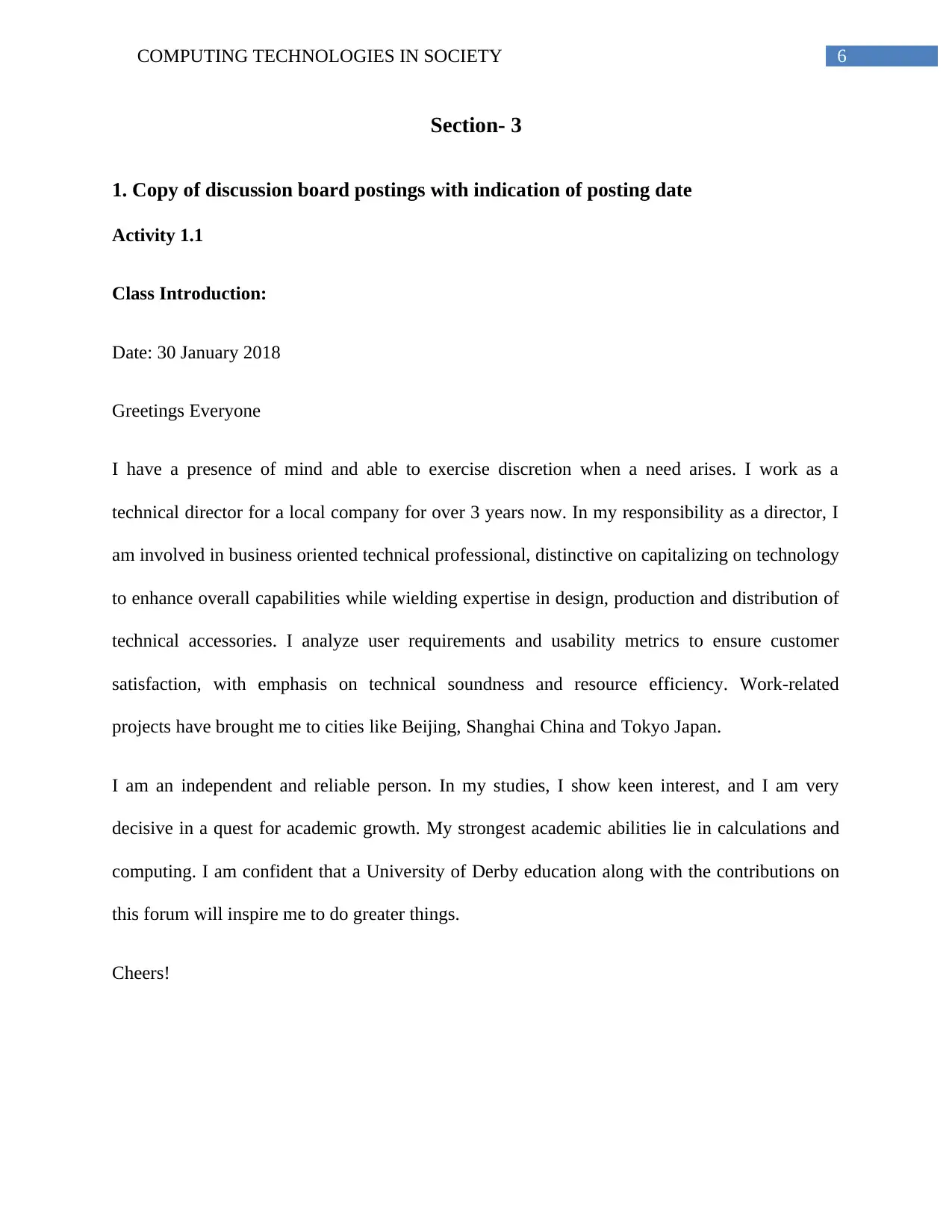
6COMPUTING TECHNOLOGIES IN SOCIETY
Section- 3
1. Copy of discussion board postings with indication of posting date
Activity 1.1
Class Introduction:
Date: 30 January 2018
Greetings Everyone
I have a presence of mind and able to exercise discretion when a need arises. I work as a
technical director for a local company for over 3 years now. In my responsibility as a director, I
am involved in business oriented technical professional, distinctive on capitalizing on technology
to enhance overall capabilities while wielding expertise in design, production and distribution of
technical accessories. I analyze user requirements and usability metrics to ensure customer
satisfaction, with emphasis on technical soundness and resource efficiency. Work-related
projects have brought me to cities like Beijing, Shanghai China and Tokyo Japan.
I am an independent and reliable person. In my studies, I show keen interest, and I am very
decisive in a quest for academic growth. My strongest academic abilities lie in calculations and
computing. I am confident that a University of Derby education along with the contributions on
this forum will inspire me to do greater things.
Cheers!
Section- 3
1. Copy of discussion board postings with indication of posting date
Activity 1.1
Class Introduction:
Date: 30 January 2018
Greetings Everyone
I have a presence of mind and able to exercise discretion when a need arises. I work as a
technical director for a local company for over 3 years now. In my responsibility as a director, I
am involved in business oriented technical professional, distinctive on capitalizing on technology
to enhance overall capabilities while wielding expertise in design, production and distribution of
technical accessories. I analyze user requirements and usability metrics to ensure customer
satisfaction, with emphasis on technical soundness and resource efficiency. Work-related
projects have brought me to cities like Beijing, Shanghai China and Tokyo Japan.
I am an independent and reliable person. In my studies, I show keen interest, and I am very
decisive in a quest for academic growth. My strongest academic abilities lie in calculations and
computing. I am confident that a University of Derby education along with the contributions on
this forum will inspire me to do greater things.
Cheers!
Paraphrase This Document
Need a fresh take? Get an instant paraphrase of this document with our AI Paraphraser
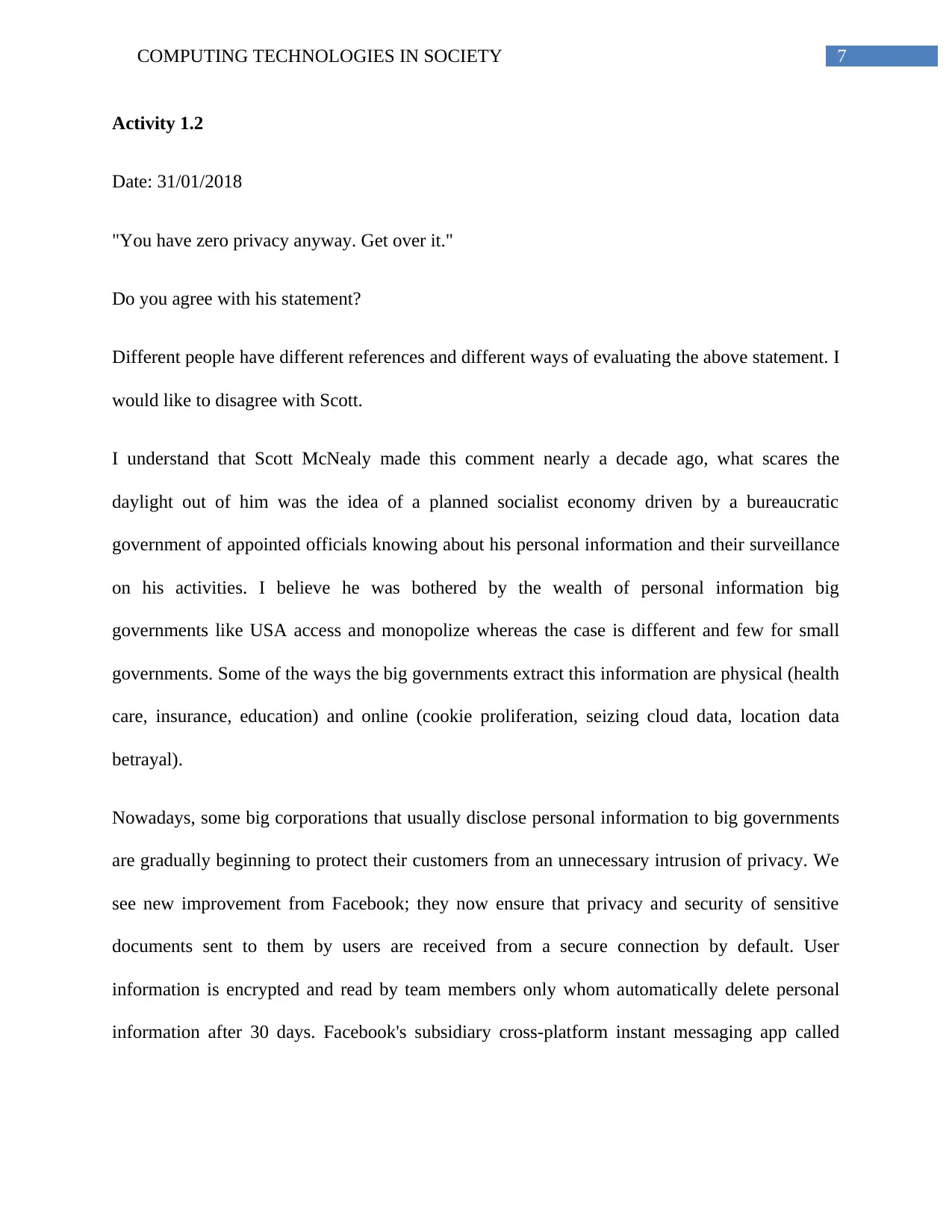
7COMPUTING TECHNOLOGIES IN SOCIETY
Activity 1.2
Date: 31/01/2018
"You have zero privacy anyway. Get over it."
Do you agree with his statement?
Different people have different references and different ways of evaluating the above statement. I
would like to disagree with Scott.
I understand that Scott McNealy made this comment nearly a decade ago, what scares the
daylight out of him was the idea of a planned socialist economy driven by a bureaucratic
government of appointed officials knowing about his personal information and their surveillance
on his activities. I believe he was bothered by the wealth of personal information big
governments like USA access and monopolize whereas the case is different and few for small
governments. Some of the ways the big governments extract this information are physical (health
care, insurance, education) and online (cookie proliferation, seizing cloud data, location data
betrayal).
Nowadays, some big corporations that usually disclose personal information to big governments
are gradually beginning to protect their customers from an unnecessary intrusion of privacy. We
see new improvement from Facebook; they now ensure that privacy and security of sensitive
documents sent to them by users are received from a secure connection by default. User
information is encrypted and read by team members only whom automatically delete personal
information after 30 days. Facebook's subsidiary cross-platform instant messaging app called
Activity 1.2
Date: 31/01/2018
"You have zero privacy anyway. Get over it."
Do you agree with his statement?
Different people have different references and different ways of evaluating the above statement. I
would like to disagree with Scott.
I understand that Scott McNealy made this comment nearly a decade ago, what scares the
daylight out of him was the idea of a planned socialist economy driven by a bureaucratic
government of appointed officials knowing about his personal information and their surveillance
on his activities. I believe he was bothered by the wealth of personal information big
governments like USA access and monopolize whereas the case is different and few for small
governments. Some of the ways the big governments extract this information are physical (health
care, insurance, education) and online (cookie proliferation, seizing cloud data, location data
betrayal).
Nowadays, some big corporations that usually disclose personal information to big governments
are gradually beginning to protect their customers from an unnecessary intrusion of privacy. We
see new improvement from Facebook; they now ensure that privacy and security of sensitive
documents sent to them by users are received from a secure connection by default. User
information is encrypted and read by team members only whom automatically delete personal
information after 30 days. Facebook's subsidiary cross-platform instant messaging app called
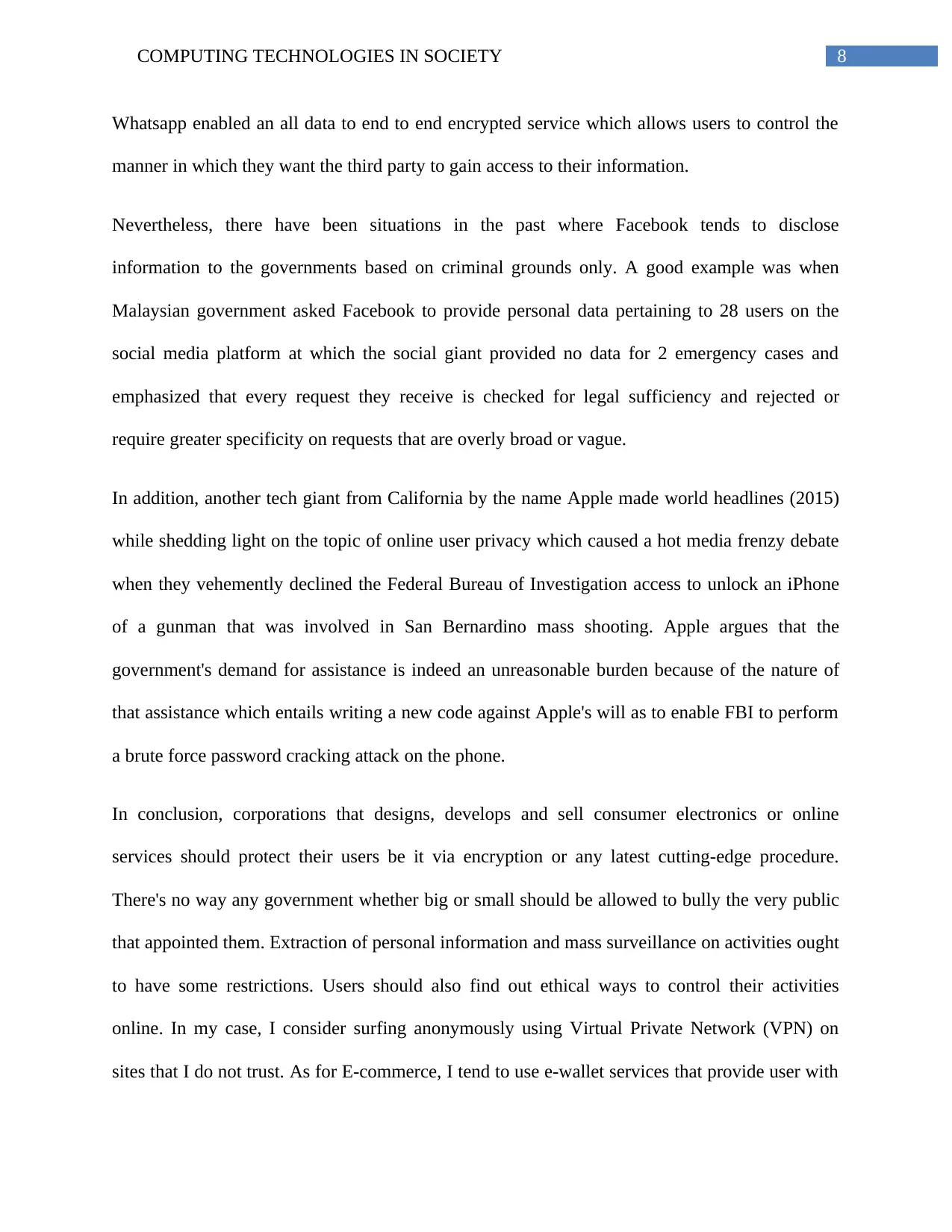
8COMPUTING TECHNOLOGIES IN SOCIETY
Whatsapp enabled an all data to end to end encrypted service which allows users to control the
manner in which they want the third party to gain access to their information.
Nevertheless, there have been situations in the past where Facebook tends to disclose
information to the governments based on criminal grounds only. A good example was when
Malaysian government asked Facebook to provide personal data pertaining to 28 users on the
social media platform at which the social giant provided no data for 2 emergency cases and
emphasized that every request they receive is checked for legal sufficiency and rejected or
require greater specificity on requests that are overly broad or vague.
In addition, another tech giant from California by the name Apple made world headlines (2015)
while shedding light on the topic of online user privacy which caused a hot media frenzy debate
when they vehemently declined the Federal Bureau of Investigation access to unlock an iPhone
of a gunman that was involved in San Bernardino mass shooting. Apple argues that the
government's demand for assistance is indeed an unreasonable burden because of the nature of
that assistance which entails writing a new code against Apple's will as to enable FBI to perform
a brute force password cracking attack on the phone.
In conclusion, corporations that designs, develops and sell consumer electronics or online
services should protect their users be it via encryption or any latest cutting-edge procedure.
There's no way any government whether big or small should be allowed to bully the very public
that appointed them. Extraction of personal information and mass surveillance on activities ought
to have some restrictions. Users should also find out ethical ways to control their activities
online. In my case, I consider surfing anonymously using Virtual Private Network (VPN) on
sites that I do not trust. As for E-commerce, I tend to use e-wallet services that provide user with
Whatsapp enabled an all data to end to end encrypted service which allows users to control the
manner in which they want the third party to gain access to their information.
Nevertheless, there have been situations in the past where Facebook tends to disclose
information to the governments based on criminal grounds only. A good example was when
Malaysian government asked Facebook to provide personal data pertaining to 28 users on the
social media platform at which the social giant provided no data for 2 emergency cases and
emphasized that every request they receive is checked for legal sufficiency and rejected or
require greater specificity on requests that are overly broad or vague.
In addition, another tech giant from California by the name Apple made world headlines (2015)
while shedding light on the topic of online user privacy which caused a hot media frenzy debate
when they vehemently declined the Federal Bureau of Investigation access to unlock an iPhone
of a gunman that was involved in San Bernardino mass shooting. Apple argues that the
government's demand for assistance is indeed an unreasonable burden because of the nature of
that assistance which entails writing a new code against Apple's will as to enable FBI to perform
a brute force password cracking attack on the phone.
In conclusion, corporations that designs, develops and sell consumer electronics or online
services should protect their users be it via encryption or any latest cutting-edge procedure.
There's no way any government whether big or small should be allowed to bully the very public
that appointed them. Extraction of personal information and mass surveillance on activities ought
to have some restrictions. Users should also find out ethical ways to control their activities
online. In my case, I consider surfing anonymously using Virtual Private Network (VPN) on
sites that I do not trust. As for E-commerce, I tend to use e-wallet services that provide user with
⊘ This is a preview!⊘
Do you want full access?
Subscribe today to unlock all pages.

Trusted by 1+ million students worldwide
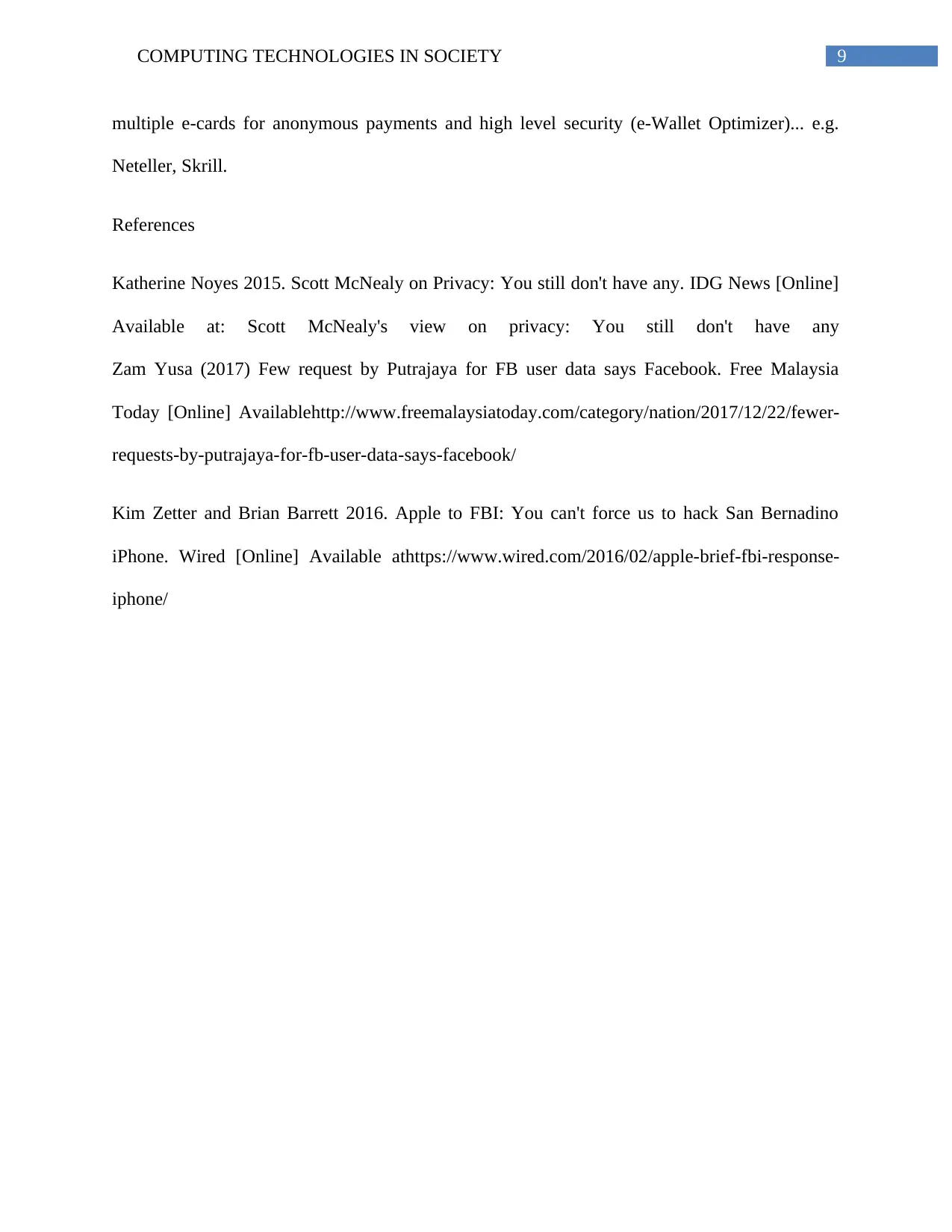
9COMPUTING TECHNOLOGIES IN SOCIETY
multiple e-cards for anonymous payments and high level security (e-Wallet Optimizer)... e.g.
Neteller, Skrill.
References
Katherine Noyes 2015. Scott McNealy on Privacy: You still don't have any. IDG News [Online]
Available at: Scott McNealy's view on privacy: You still don't have any
Zam Yusa (2017) Few request by Putrajaya for FB user data says Facebook. Free Malaysia
Today [Online] Availablehttp://www.freemalaysiatoday.com/category/nation/2017/12/22/fewer-
requests-by-putrajaya-for-fb-user-data-says-facebook/
Kim Zetter and Brian Barrett 2016. Apple to FBI: You can't force us to hack San Bernadino
iPhone. Wired [Online] Available athttps://www.wired.com/2016/02/apple-brief-fbi-response-
iphone/
multiple e-cards for anonymous payments and high level security (e-Wallet Optimizer)... e.g.
Neteller, Skrill.
References
Katherine Noyes 2015. Scott McNealy on Privacy: You still don't have any. IDG News [Online]
Available at: Scott McNealy's view on privacy: You still don't have any
Zam Yusa (2017) Few request by Putrajaya for FB user data says Facebook. Free Malaysia
Today [Online] Availablehttp://www.freemalaysiatoday.com/category/nation/2017/12/22/fewer-
requests-by-putrajaya-for-fb-user-data-says-facebook/
Kim Zetter and Brian Barrett 2016. Apple to FBI: You can't force us to hack San Bernadino
iPhone. Wired [Online] Available athttps://www.wired.com/2016/02/apple-brief-fbi-response-
iphone/
Paraphrase This Document
Need a fresh take? Get an instant paraphrase of this document with our AI Paraphraser
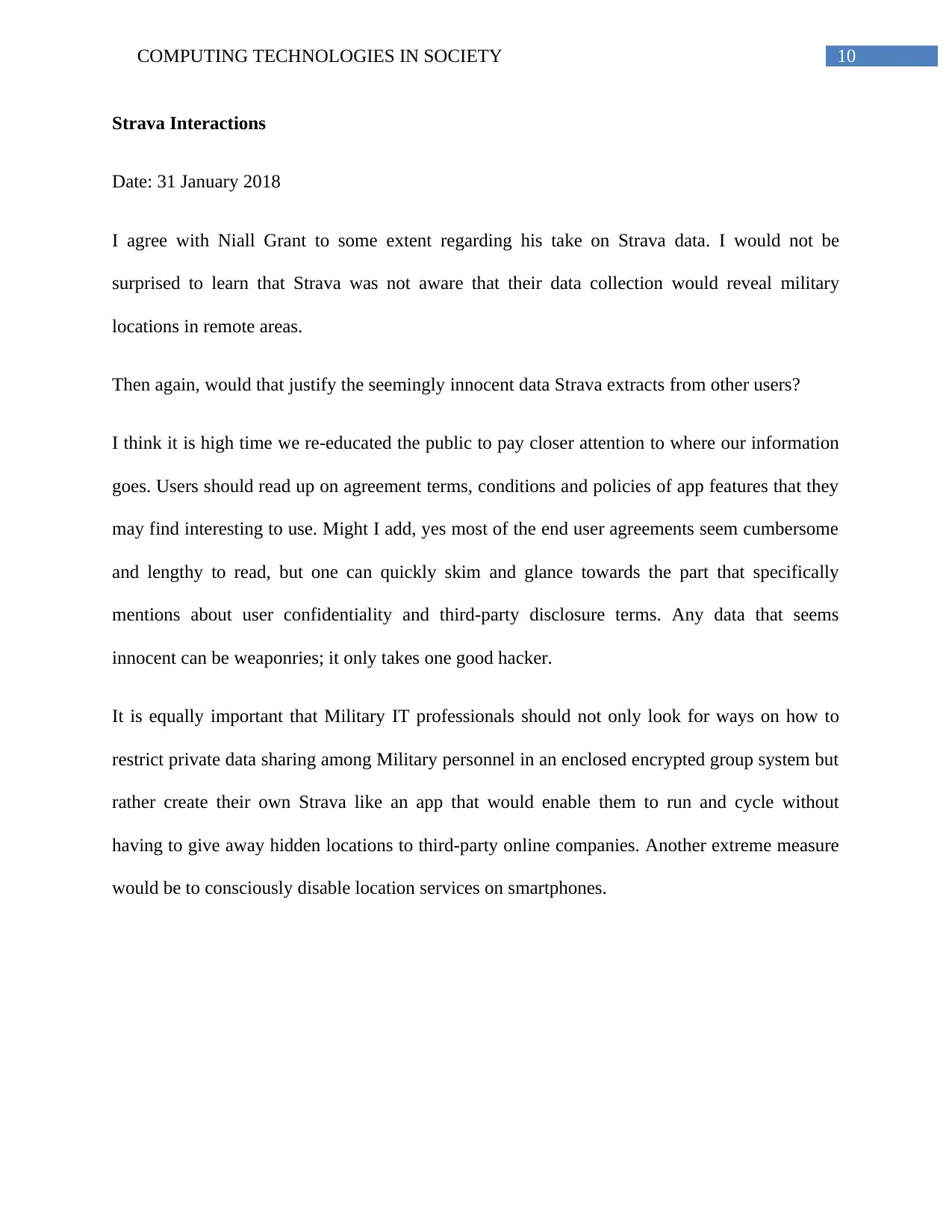
10COMPUTING TECHNOLOGIES IN SOCIETY
Strava Interactions
Date: 31 January 2018
I agree with Niall Grant to some extent regarding his take on Strava data. I would not be
surprised to learn that Strava was not aware that their data collection would reveal military
locations in remote areas.
Then again, would that justify the seemingly innocent data Strava extracts from other users?
I think it is high time we re-educated the public to pay closer attention to where our information
goes. Users should read up on agreement terms, conditions and policies of app features that they
may find interesting to use. Might I add, yes most of the end user agreements seem cumbersome
and lengthy to read, but one can quickly skim and glance towards the part that specifically
mentions about user confidentiality and third-party disclosure terms. Any data that seems
innocent can be weaponries; it only takes one good hacker.
It is equally important that Military IT professionals should not only look for ways on how to
restrict private data sharing among Military personnel in an enclosed encrypted group system but
rather create their own Strava like an app that would enable them to run and cycle without
having to give away hidden locations to third-party online companies. Another extreme measure
would be to consciously disable location services on smartphones.
Strava Interactions
Date: 31 January 2018
I agree with Niall Grant to some extent regarding his take on Strava data. I would not be
surprised to learn that Strava was not aware that their data collection would reveal military
locations in remote areas.
Then again, would that justify the seemingly innocent data Strava extracts from other users?
I think it is high time we re-educated the public to pay closer attention to where our information
goes. Users should read up on agreement terms, conditions and policies of app features that they
may find interesting to use. Might I add, yes most of the end user agreements seem cumbersome
and lengthy to read, but one can quickly skim and glance towards the part that specifically
mentions about user confidentiality and third-party disclosure terms. Any data that seems
innocent can be weaponries; it only takes one good hacker.
It is equally important that Military IT professionals should not only look for ways on how to
restrict private data sharing among Military personnel in an enclosed encrypted group system but
rather create their own Strava like an app that would enable them to run and cycle without
having to give away hidden locations to third-party online companies. Another extreme measure
would be to consciously disable location services on smartphones.
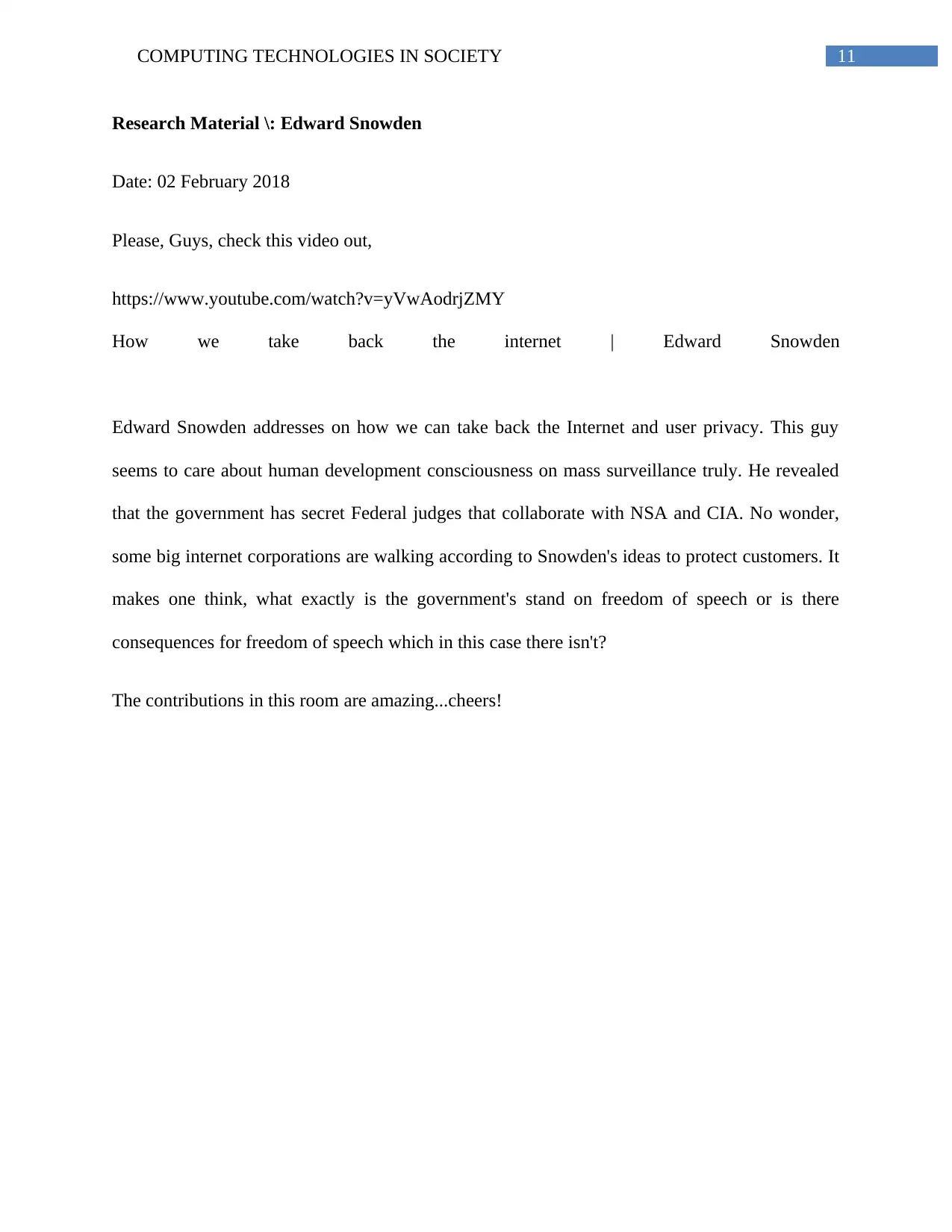
11COMPUTING TECHNOLOGIES IN SOCIETY
Research Material \: Edward Snowden
Date: 02 February 2018
Please, Guys, check this video out,
https://www.youtube.com/watch?v=yVwAodrjZMY
How we take back the internet | Edward Snowden
Edward Snowden addresses on how we can take back the Internet and user privacy. This guy
seems to care about human development consciousness on mass surveillance truly. He revealed
that the government has secret Federal judges that collaborate with NSA and CIA. No wonder,
some big internet corporations are walking according to Snowden's ideas to protect customers. It
makes one think, what exactly is the government's stand on freedom of speech or is there
consequences for freedom of speech which in this case there isn't?
The contributions in this room are amazing...cheers!
Research Material \: Edward Snowden
Date: 02 February 2018
Please, Guys, check this video out,
https://www.youtube.com/watch?v=yVwAodrjZMY
How we take back the internet | Edward Snowden
Edward Snowden addresses on how we can take back the Internet and user privacy. This guy
seems to care about human development consciousness on mass surveillance truly. He revealed
that the government has secret Federal judges that collaborate with NSA and CIA. No wonder,
some big internet corporations are walking according to Snowden's ideas to protect customers. It
makes one think, what exactly is the government's stand on freedom of speech or is there
consequences for freedom of speech which in this case there isn't?
The contributions in this room are amazing...cheers!
⊘ This is a preview!⊘
Do you want full access?
Subscribe today to unlock all pages.

Trusted by 1+ million students worldwide
1 out of 74
Your All-in-One AI-Powered Toolkit for Academic Success.
+13062052269
info@desklib.com
Available 24*7 on WhatsApp / Email
![[object Object]](/_next/static/media/star-bottom.7253800d.svg)
Unlock your academic potential
Copyright © 2020–2025 A2Z Services. All Rights Reserved. Developed and managed by ZUCOL.